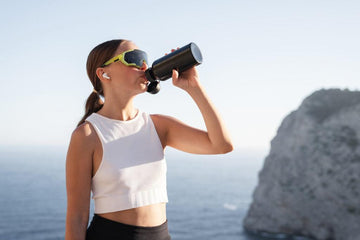Electrolytes play a crucial role in our bodies, especially during physical activity. They are important for maintaining fluid balance, muscle contraction, and nerve function. In this post, you'll learn why electrolytes are essential for exercise, the specific functions they perform, and how to make sure you're getting enough electrolytes.
What are electrolytes?
Electrolytes are minerals that are dissolved in body fluids and carry electrical charges. The most important electrolytes in the body are:
-
Sodium (Na+): Important for regulating fluid balance and muscle and nerve function.
-
Potassium (K+): Supports muscle contraction and nerve function.
-
Calcium (Ca2+): Plays a central role in muscle contraction and blood clotting.
-
Magnesium (Mg2+): Important for muscle function, energy production and blood pressure regulation.
-
Chloride (Cl-): Contributes to maintaining fluid balance and acid-base balance.
-
Phosphate (PO4 3-): Involved in energy production and the formation of bones and teeth.
The role of electrolytes in the body
Maintaining fluid balance
Electrolytes help regulate the body's fluid balance by controlling the transport of water in and out of cells. Sodium and chloride are particularly important for maintaining osmotic pressure, which affects the distribution of water in the different compartments of the body (intracellular and extracellular).
Muscle contraction and nerve function
Electrolytes are crucial for the function of muscles and nerves. Sodium and potassium are involved in the generation and transmission of nerve impulses. Calcium plays a central role in muscle contraction by enabling the interaction between actin and myosin in the muscle fibers. Magnesium is also important for muscle relaxation after a contraction.
Acid-base balance
Electrolytes help maintain acid-base balance in the body. This is important for keeping the pH of the blood and other body fluids stable, which is necessary for the normal functioning of enzymes and metabolic processes.
Why are electrolytes important for training?
Avoiding dehydration
During exercise, the body loses fluids and electrolytes through sweating and breathing. If these losses are not replaced, dehydration can occur. Dehydration can impair physical performance, increase heart rate, and increase the risk of heat-related illnesses such as heat stroke and heat cramps.
Maintaining muscle function
An imbalance of electrolytes, particularly sodium, potassium and calcium, can lead to muscle cramps and weakness. Adequate electrolyte intake is therefore important to maintain muscle function and prevent muscle cramps, which often occur during intense or prolonged physical activity.
Support for endurance performance
Electrolytes play an important role in energy production and maintaining endurance performance. Magnesium and phosphate are involved in the production of ATP (adenosine triphosphate), the main energy carrier of cells. An adequate supply of these electrolytes can help to optimize energy production and delay fatigue.
How to get enough electrolytes
Nutrition
Most people can meet their electrolyte needs through a balanced diet. Here are some foods rich in electrolytes:
-
Sodium: salt, soups, broths, cheese
-
Potassium: bananas, oranges, potatoes, spinach, avocados
-
Calcium: dairy products, green leafy vegetables, almonds, fortified plant-based milk
-
Magnesium: nuts, seeds, whole grains, dark green vegetables, fish
-
Chloride: salt, olives, seafood
-
Phosphate: meat, fish, eggs, dairy products, legumes
Electrolyte drinks
During intense or prolonged physical activity, it may be necessary to replace electrolytes with special drinks. Electrolyte drinks contain a mixture of water, sugar and electrolytes and are designed to quickly replace the electrolytes lost during sweating. Be sure to choose a drink that contains the right electrolytes in the right amounts to meet your needs.
Dietary supplements
In some cases, it may be useful to supplement electrolytes, especially when needs cannot be met through diet and beverages. However, always consult a doctor or nutritionist before taking any supplement to ensure you are getting the correct dosage and composition.
Tips for the correct use of electrolytes during training
-
Drink regularly: Make sure to drink regularly during exercise to avoid dehydration. Drink small amounts of water or an electrolyte drink at regular intervals.
-
Monitor your body: Watch for signs of electrolyte imbalances such as muscle cramps, fatigue, dizziness, or nausea. Adjust your electrolyte intake accordingly.
-
Plan ahead: During intense training sessions or competitions, plan ahead for how you will replace your electrolytes. Carry electrolyte drinks or supplements with you.
-
Consider individual needs: Everyone sweats at different rates and loses different amounts of electrolytes. Consider your individual needs and adjust your electrolyte intake accordingly.
-
Adjust your diet: Eating a balanced diet is the best way to ensure you get enough electrolytes. Make sure you eat a varied diet rich in fruits, vegetables, nuts, seeds and dairy products.
Conclusion
Electrolytes are vital for exercise as they help maintain fluid balance, muscle function and nerve function. An imbalance of electrolytes can impair physical performance and increase the risk of dehydration and muscle cramps. By eating a balanced diet, choosing the right electrolyte drinks and supplements where necessary, you can ensure that your body is optimally supplied with electrolytes and that you can perform your workout to the best of your ability.





